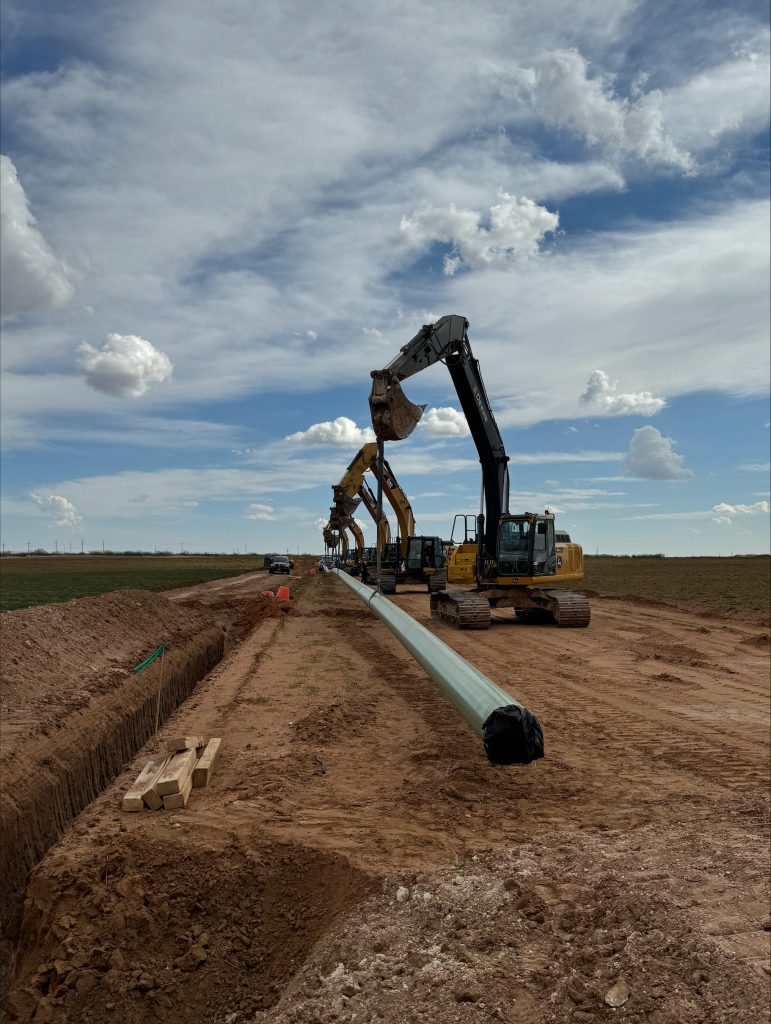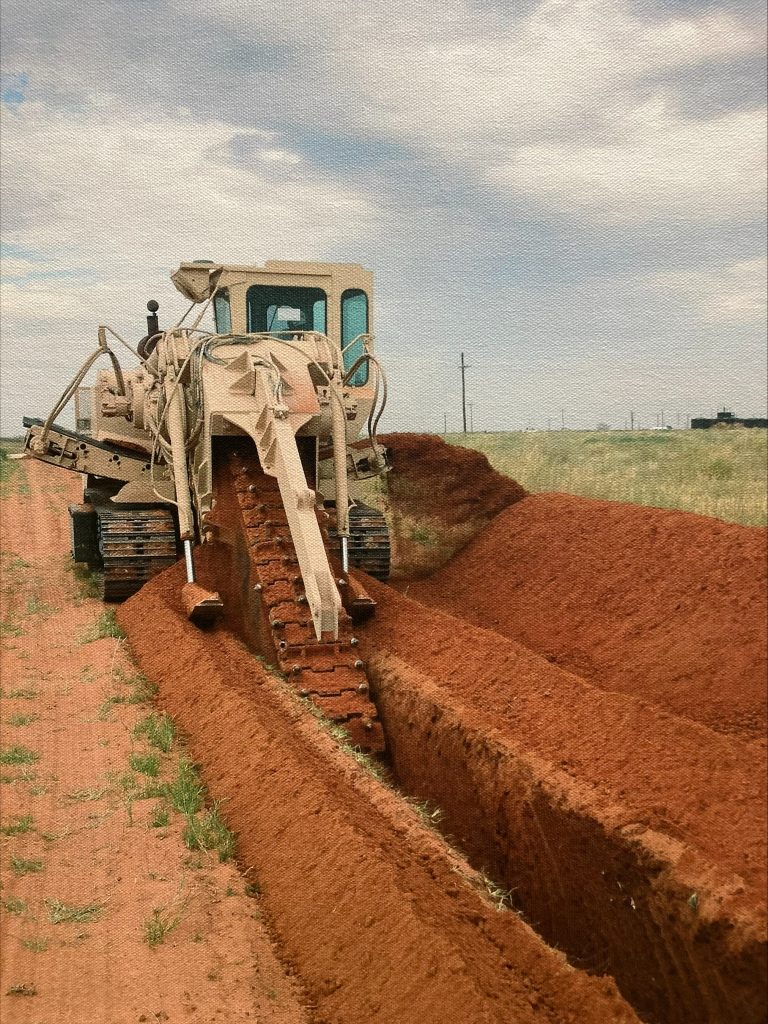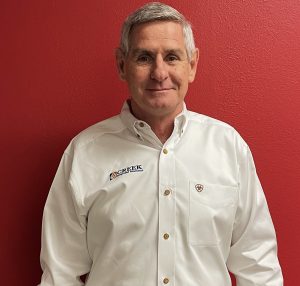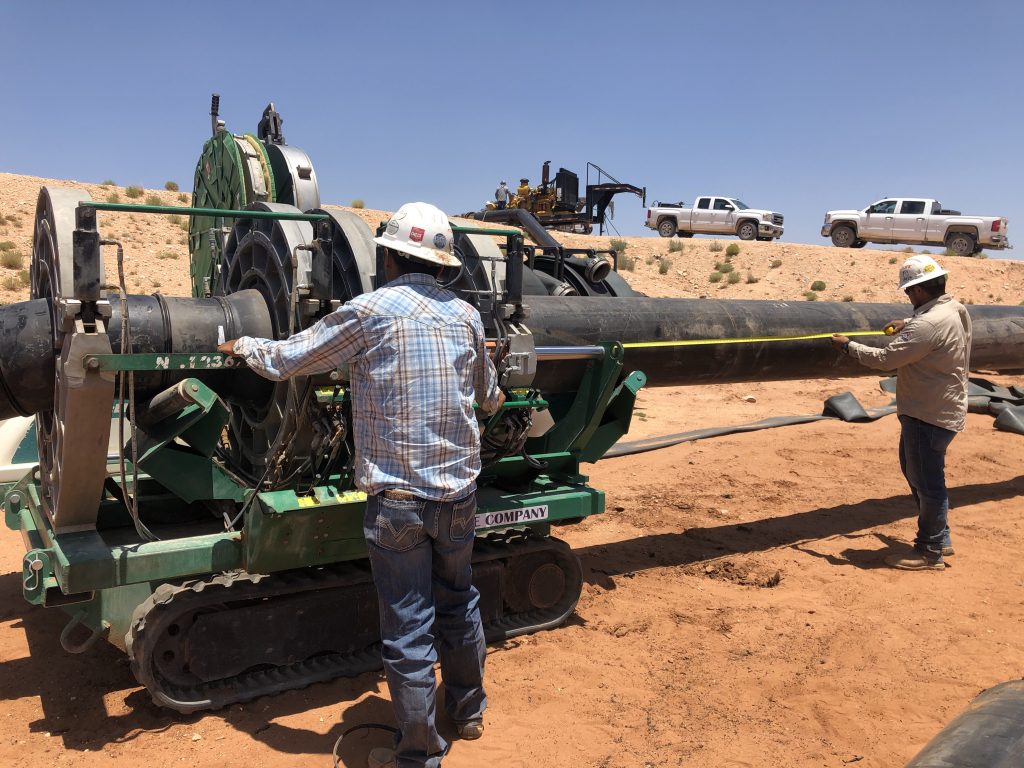Some business coaches cite the 80-20 rule—which says 80 percent of a company’s productivity comes from 20 percent of its product lines—to recommend identifying and eliminating the less productive offerings in order to increase profits. That works great in a static business sector, where your main product or service line can be predicted.
But in the whirling winds and shifting sands of the Oil Patch, supporting those less-profitable options is like paying premiums for business survival insurance. You never know when your main squeeze in the dance will dump you for another—and having other options is indeed survival.
In this story, while Martin’s, Inc., Creek Pipe, and Encore Pipe and Construction have had much success in oilfield dirt work and construction, all have grown from tiny roots to significant businesses by expanding organically and managing finances. And they have survived downturns and pandemics by pivoting to other income streams as markets have shifted.
Martin’s Inc.
Martin’s, Inc. President Adrian Gonzales says his late founding father, Martin, started the business on a shoestring in 1992 and grew it organically as opportunities presented themselves. In fact, the dirt and construction work that became a mainstay of the business came along later.
In 1992 the elder Gonzales was working at Bud’s Services, which was slowly failing due to a combination of the two-decade downturn and the death of the owner. He was approached with an opportunity to handle enviro vacs, used in the process of collecting oil and fluids around the wellhead, Adrian recalled. One vac quickly grew to 20.
“From there,” said Adrian, “one service led to another. There was a need for a backhoe, and a roustabout.” And then yet more. “Over the years we progressed into doing a lot of dirt work, building locations, which is what we’ve mostly done over the years—dirt work and roustabouts.”
In the last 5-10 years, he added, the company has further diversified into cranes and hydrovacs. From about a dozen employees in the early days, the roster reached 70 at one time. Since the pandemic they’ve settled in at about 50.
Oil in the Blood
At the start the younger Gonzales was a teenager, but he worked his way up, getting a CDL and working with his father on a side business moving mobile homes. Upon high school graduation Adrian and his parents decided he should go to college—a first for his family.
His father had left ninth grade to travel Nebraska and Colorado working with livestock. While at a job in Colorado, he learned there were steady oilfield jobs in Andrews, near his birthplace of Stanton. He’d met and married Maria while in Colorado, and they were looking for work that would not require constant moving. That was in 1982, just before the bottom fell out of the oil market.
Fast forward to 2001, and Adrian was graduating from Texas Tech with a business degree, planning to continue his college job with Wells Fargo.
Then came 9/11. “Once I saw everybody shutting the doors because it seemed like the end of the world, my dad said, ‘Just come over here and help me out.’” The new graduate already knew Dad’s business inside out, and the disaster had shown both generations the uncertainty of life and the importance of family. The decision was easy.
Because of his business degree, Adrian worked mostly in the office for the next 20 years. He likes the fact that the job involves both indoor and outdoor work and that, “I’m not just stuck in an office job” as he would have been in a bank.
His father’s untimely passing in February of 2022 pushed the son into some unfamiliar territory. “He did a lot of stuff I didn’t do, including taking care of my mom and the cattle and the horses. And the mechanic work—he was a mastermind; he was great with his hands.”
Time for a Change
The pandemic and multipad drilling also parked much of the company’s dirt work equipment. Adrian was challenged because “the mastermind of it all is gone, and I’m stuck with no work, so what do we do?” Prayer and a providential entry into hydrovac evacuations shortly before the pandemic saved the company. Now environmental cleanups are keeping the company alive.
In 2019, the Andrews Chamber of Commerce presented Martin and Maria with the Pioneer Award. At the ceremony Adrian gave the introductory address. In that address, he said, “They’ve come to love Andrews, and Andrews has slowly come to love them. They started a business about 1992, making the INC. Magazine 5000’s list of fastest growing businesses back in 2008, at #1402. They weren’t looking to start a business—things just kind of came together, as if (by) Divine Providence.”
Creek Pipe’s John Muldrow: From Land to Dirt
Creek Pipe President John Muldrow came to oilfield construction from the real estate investment business, where he’d built a very successful firm. That business dealt with investing in real estate in Midland/Odessa, Big Spring, Dallas/Ft. Worth, and in the Virgin Islands.
In 2014 Matthew Creek founded Creek Pipe, Muldrow related, noting that the founder decided to sell the company and go to law school. Muldrow bought the company from Creek in 2017.
At that time Creek Pipe had 10 employees serving only three clients, focusing on HDPE pipeline construction. Now, “Just under seven years later, we have about 40 clients and 45 employees,” Muldrow said, “plus the acquisition of all of the equipment, machinery necessary to continue to do the oilfield pipeline construction business, plus location and construction, without having to turn to third-party vendors.”
Muldrow’s previous business experience taught him the value of controlling costs. Renting instead of owning equipment meant “you lost a little of your pricing capabilities because you’re paying that money to a third party, as opposed to amortizing your own equipment.” Plus, they were better able to manage the deployment of equipment.
Owning machinery has also let them become a rental company themselves, Creek said. “We have the second largest inventory of the McElroy fusing machines available for customers to rent [in the Permian Basin].”
As with the Gonzales family, Muldrow clearly saw the advantages of diversification. “When Matt had the company he focused on large pipelines, and we branched off into, not only the large pipeline, but into service work, smaller pipelines, infield infrastructure. Our client base spans large oil and gas operators to regional oil and gas operators to small oil and gas operators, all the way to the sand plants, the environmental companies, and their facilities,” he said.
That way, “If a particular sector suddenly got slow, obviously we would have better odds of staying busy.” Muldrow has also added an HDPE fusing equipment rental company and trucking company to the Creek family.
Diversification served them well during COVID, as Muldrow reports the company turned a profit in 2020, even with about a four-month slow period that year.
And the expansion plans continue. “Also, in a short time we will be manufacturing HDPE pipe right here in the Permian Basin, as well as a new product called RTP, for reinforced thermal plastic pipe. That product is commonly used on location from wellheads to the facilities and other more permanent surface installations,” he related.
With the addition of manufacturing, they will not only be able to control much more of their own supply chain, Creek also will be able to sell products to others.
Why Buy into the Oil Business?
Muldrow thinks of this move as an experiment. “I wanted to find out for myself if the principles that I used in my real estate investment business for 35 years where we were very successful, if those same leadership principles and customer-centered efforts and focus, if it would prove to be the same in another industry.”
After seven years in the business he can declare, “I happen to believe that they do.”
Pipelines were of particular interest because Muldrow’s father, a surveyor and civil engineer, had been in the pipeline business.
Encore Pipe Stays Ahead of the Game
Encore Pipe and Construction’s work largely revolves around construction of pipelines for oil, gas, and water from new production sites, said company President Kane Whitaker and CFO Jody Louder. Those pipelines typically connect the wellhead to storage or processing facilities, or to the sales line. The company’s workforce, ranging from 250-300, is all based in the Permian, working primarily in the Midland/Odessa area.
“Poly pipe is what we use for 75 percent of what we do,” Louder said, with carbon steel pipe, fiberglass, and the newer composites also part of the mix. “We do pipeline construction in a turnkey operation, taking the project from beginning to end.”
As E&Ps continue their rush to getting wells into production, Louder noted that many clients now schedule Encore to construct water pipelines to saltwater disposal wells (SWDs) or storage before the well is completed. That way production can start as soon as the well itself is ready. Also, little-to-no water is trucked, reducing costs and improving safety.
He added that they are seeing more and more producers pool and share produced water because more of them are dedicated to reducing reliance on groundwater and to cutting the number of SWD-induced earthquakes.
Like Creek and Martin’s, Encore is finding ways around the current slowdown in drilling. Whitaker explained, “When the drilling slows down, we try to direct our business into the maintenance side because these guys [clients] have a long list of things like leaks that they want to have repaired. They’re mandated to do a lot of these types of things, so it’s keeping us busy on that side when we see that the drilling slows down.”
That tactic is working. “Right now, we are busy, we have a backlog of business,” Louder said.
For construction, the industry began moving toward the use of hydrovacs about five years ago. Encore is on board with using these large, environmentally friendly machines. Hydrovacs use water, via a high-pressure wand, to erode the soil in the digging process, which is sucked up using a high-volume vacuum hose. It virtually eliminates the possibility of striking any existing pipe in the digging process.
Fourteen Years of Growth
Whitaker had been vice president at the previous company, which was sold to a major pipe supplier. But before long, former associates were begging him to come back to the business. He started Encore Pipe and Construction in 2012—so named because it was his return to the pipe business—with just six employees. They were in a two-acre site on Marlin Street, on Highway 349 south of Midland. Self-financed at first, the company grew slowly.
Because Whitaker also owned an equipment rental company, Encore rented machinery from there to begin with. As revenue increased, the company purchased its own equipment to save costs and ensure they could obtain the pieces required on the schedule they needed.
They now have a large facility on 14 acres of I-20 frontage.
Paul Wiseman is a freelance writer in the energy industry. His email address is fittoprint414@gmail.com.














